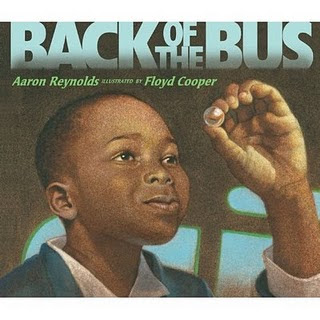Back of the Bus - For MLK Jr.day

Title:Back of the bus
Author: Aaron Reynolds
Illustrator: Floyd Cooper
Publisher: Philomel
Age group:4-8
Last year my daughter and I had read Woodson's "The other side" during the week of MLK Jr. day. It had served our intent very well, while ensuring that we stayed in the comfort of Subtlety, and the warmth of a story of two little girls in the countryside. I remember how the girls of different skin tones, afraid of crossing "boundaries", had rightfully chosen to sit on the fence together. I had immediately reviewed it here.
This week we brought home a few books celebrating MLK Jr or what he stood for. Among them I found a gem. It was perfect for us, in that, it helped me inch forward in the right direction on the same subject. This, it did, in two solid ways. For one, we read about actually "crossing a boundary" this time around. Secondly, it was more than subtle. It carried a bit of history and eased me into introducing civil rights and the fight for it. Yet, it was not too big a leap because we still stayed with a boy her age, his perspective and a simple narration of a true incident.
A child is riding the bus that Rosa Parks rode on December 1, 1955, Montgomery, Alabama. And the last trail of italicized words is how the book begins - verbatim. The combination of a boy's perspective of the historical incident while the boy is a piece of fiction, makes it a good book for young children.
We're sittin' right where we we're supposed to - way in back.
The boy's words allowed me to give her the background. The boy is seen peeping out the window of a bus on a wintry morning. That morning ( she later learned) witnessed a solitary act of defiance that sparked a movement, that later changed America. Quite immediately we seem to be looking at a playful boy slouched on the backseat, rolling his marble on a groove on the floor of the bus. In fact Mrs.Parks sitting upfront returns his runaway marble for him. More people get in. The bus is now packed. But in a little while, the boy senses tension. The driver is arguing. It is getting very humid inside because the crowded bus is not moving. The boy's mama does not let him distract himself with his marble, so he sends it back into his pocket. But soon, he gets a grasp of what's happening - of Mrs.Parks not willing to give up her seat for Mr.Blake, the white rider.
But she's sittin' right there,
her eyes all fierce like a lightnin' storm,
like maybe she does belong up there.
And I start thinkin' maybe she does too.
Beside this is a portrait of the lady, her chin up and looking out the window. This is probably the right time to glorify the illustrations. They are generous in earth tones and are extremely realistic and beautiful. They bear the quality that takes us back in time - whatever that is! Floyd Cooper's work is amazing.
Getting back on track, the debate ends inside the bus. The boy sees a handcuffed Rosa Parks being escorted by a policeman. His mama murmurs something to herself and also reassures him that everything is alright. But he feels different, in a good stronger way. He takes his marble from its hiding place and holds it against the sunlight.
That thing shines all brown and golden in the sunlight,
like it's smilin', I think.
'Cuz it ain't gotta hide no more.
I did not labor to explain the marble metaphor to her. The incident was already simmering the idea. History imparted with a childish attitude was very helpful. There was also a lyrical quality to the text that made the read-aloud powerful. The language was African-American and that added authenticity. I had pointed out how, many basic rights, now taken granted, were once forbidden. We went over areas that might have been segregated, like schools and transportation. We went on to predict what now seemingly normal practices carried the potential to be protested one day.
I read elsewhere that Rosa Parks was probably not the first to be arrested for such a "crime", but she was the first prominent figure to have disobeyed, and that probably influenced and motivated many in the nation. Martin Luther King Jr. initiated and continued the bus boycott that Rosa Parks' act had triggered. He was eventually instrumental in bringing social change in America, adopting Gandhian principles.
The other books that we are reading to celebrate history and change, in the context of Martin Luther King Jr.'s birthday are -
 Our Children Can Soar: A Celebration of Rosa, Barack, and the Pioneers of Change by Michelle Cook
Our Children Can Soar: A Celebration of Rosa, Barack, and the Pioneers of Change by Michelle Cook Dad, Jackie and me by Myron Uhlberg.
Dad, Jackie and me by Myron Uhlberg.


